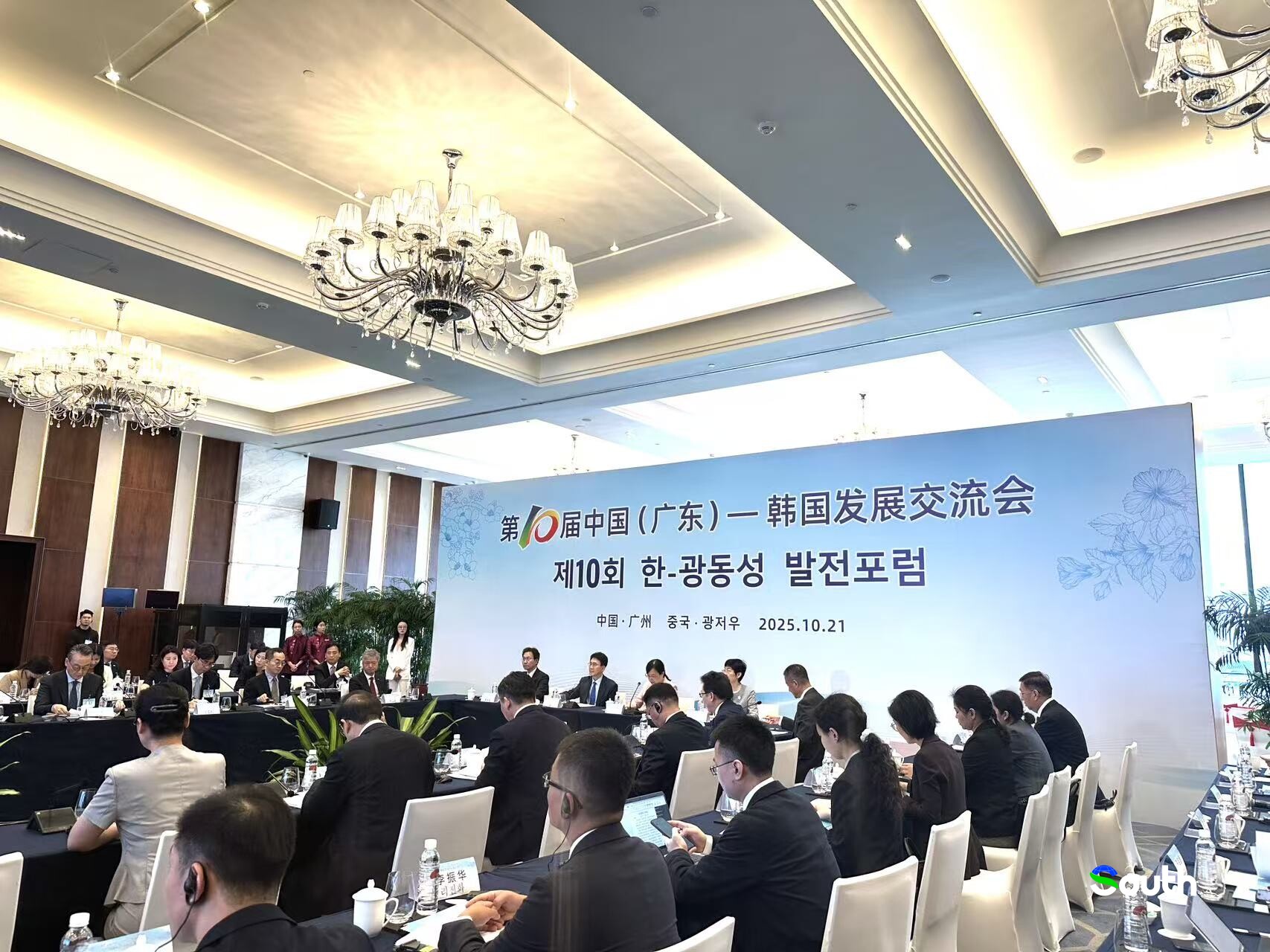Guangdong, South Korea open dialogue in Guangzhou, eyeing partnership on new quality productive forces
On October 21, the 10th China (Guangdong)–South Korea Development and Exchange Conference concluded in Guangzhou, setting a clear roadmap for bilateral cooperation in high-tech sectors. Co-organized by the People's Government of Guangdong Province and South Korea's Ministry of Trade, Industry and Energy, the conference gathered around 80 senior officials, institutional representatives, and business delegates.

Under the theme "Gathering Momentum for New Quality Productive Forces, Stimulating New Drivers of Cooperation," the meeting produced a consensus to deepen collaboration and jointly overcome operational barriers to advance new quality productive forces.
During the meeting, senior officials and enterprise representatives reported concrete progress in hydrogen energy, artificial intelligence, and the low-altitude economy, while outlining specific pathways to expand cooperation.
According to Ms. Zhang Guozhi, Vice Governor of Guangdong Province, the province's strong economic performance, with a 2024 GDP surpassing RMB 14 trillion and a January-September import-export volume exceeding RMB 7 trillion, provides a solid platform for cooperation. "Particularly significant is the growing trade with South Korea, which reached approximately RMB 330 billion in the first three quarters, representing 19% of total China-South Korea trade," she noted.
She highlighted that the province remains at the forefront of China-South Korea cooperation, pointing to successful projects like LG Display, Hyundai Motor's hydrogen fuel cell system, and SK's new polyester materials as evidence of the thriving partnership.
Echoing the need for upgraded collaboration, Mr. Park Jong-won, Deputy Minister of South Korea's Ministry of Trade, Industry and Energy, observed that bilateral economic cooperation is undergoing a fundamental shift. Rather than relying on traditional manufacturing, he emphasized that both sides are moving toward advanced technology fields, specifically identifying the low-altitude economy, artificial intelligence, renewable energy, and biopharmaceuticals as having particular potential for synergy.
A key focus was the enterprise dialogue session, where company leaders shared operational experiences and proposed next-step plans.
In the new energy sector, a representative from Hyundai Motor Group (China) reported, "We completed the HTWO Guangzhou hydrogen fuel cell plant in just 14 months—what many called a 'miracle' in local industry." The company is now exploring applications in commercial vehicles and other fields. Meanwhile, Hongji Creat, a Guangdong fuel cell firm, confirmed that its membrane electrode products have been delivered to Hyundai and passed validation tests, signaling deepening technical synergy.
In artificial intelligence, Wandechang Intelligent Technology raised concerns over customs bottlenecks. The company's chairman stated, "Customs clearance for key components like sensors now takes 8 to 12 days, not 3 to 5, which severely disrupts our production schedules." By contrast, South Korea's AIBIZ showcased its AI diagnostic technology, which reduces defect analysis time in semiconductor manufacturing from 38 days to one hour.
In the low-altitude economy, EHang Intelligent confirmed it had obtained all three type certificates from the Civil Aviation Administration of China for its EH216-S unmanned aircraft. Despite demonstration flights in Seoul and Jeju, the firm's vice president noted, "The lack of a mutual airworthiness certification mechanism between China and South Korea remains a major barrier to scaling our operations here."
In response to these insights, government agencies from both sides offered policy reassurances. The Guangdong Department of Commerce reiterated incentives such as a 3% investment reward for high-tech enterprises and up to RMB 50 million for establishing regional headquarters.
On customs delays, South Korea's Ministry of Trade, Industry and Energy committed to referring the issue to relevant customs and trade committees. Regarding eVTOL airworthiness standards, the ministry acknowledged the complexity but pledged coordination with the Ministry of Land, Infrastructure and Transport.
In closing, Vice Governor of Guangdong Province Zhang Guozhi urged, "We must transform dialogue into action—focusing not only on what we have achieved but on what we can build together in fields like AI, hydrogen, and the low-altitude economy." Her South Korean counterpart, Deputy Minister Park Jong-won, added, "Working closely to align standards and ease cross-border trade will help us turn a shared vision into shared success."
Copyright © Foreign Affairs Office of Guangzhou Municipal Government,
Hong Kong and Macao Affairs Office of Guangzhou Municipal Government All rights reserved.
PRESENTED BY GDTODAY.
粤ICP备09176539号-5
![]() 粤公网安备44010402003415号
粤公网安备44010402003415号



